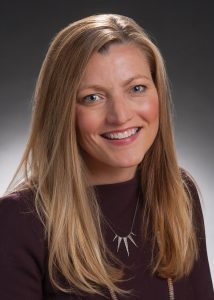A book club led by Community Foundation of North Louisiana
Written by Kristi Gustavson, CEO of the Community Foundation


I am a reader. That said, if I am a reader, my husband is a READER! (And obsessive lover of music, but that is for another article.) My husband enthusiastically loves a book or an author almost as much as a friend. Sometimes when he reads, he cannot wait until the end of the chapter or even the page to tell me about the brilliant, witty or mind-boggling thing he just read about. He just has to share it right then, in the moment. Because he is such a consumer of books, he is my personal, at-home, book club curator. His nightstand literally has so many books stacked up they constantly fall over. Needless to say, I have a pre-vetted and interestingly balanced “Little Free Library” just a few feet away.
One writer much beloved by my husband is the late David Foster Wallace. In 2005, Mr. Wallace delivered a commencement speech entitled “This is Water” at Kenyon College. Wallace warned the young graduates of the difficulties of controlling one’s own thoughts and urged them to seek the ultimate freedom of awareness. Wallace explained, “Everything in my own immediate experience supports my deep belief that I am the absolute center of the universe; the realist, most vivid and important person in existence …it’s pretty much the same for all of us … It is our default setting, hard-wired in our boards at birth … other people’s thoughts and feelings have to have to be communicated to you somehow, but your own are so immediate, urgent, real.” As people we must do the hard work required to get “free of [our] natural, hard-wired default setting which is to be deeply and literally self-centered and to see and interpret everything through this lens of self.” We must stay alert and attentive and “exercise control over how and what we think.” This means “being conscious and aware enough to choose what you pay attention to and how to choose how you construct meaning from experience.” Simply, Wallace wants us to fight our natural human proclivity to become the very center of our own universe and instead pay attention, much attention, to the world around us.
I recently heard a story about a professor who walked into his classroom and declared to his class that there would be a pop quiz that day. He passed out the quiz face down and then asked the students to turn over the page. The students looked around in confusion as they all discovered that the paper only had one black dot in the center. To answer the quiz, they were simply instructed to describe what they saw. Each student described the dot: its size, color and/or location on the page. Not one student described the white space that existed around the dot. The professor explained to the class that their hyper focus on the importance of the dot made them miss everything around it.
I began my tenure as Chief Executive Officer of Community Foundation of North Louisiana in January 2018. I spent much of the last two years learning about the challenges our community faces. Of course, I still have much to learn as our community and its problems are complicated and nuanced like layers of an infinite onion. That said, it is a privilege to be in a perpetual state of learning about one’s community, a privilege that I do not take for granted.
To understand why we at CFNLA want to start a book club, I feel compelled to provide you with a bit of background information. Community foundations are endowments, created from generous gifts from donors, intended to last in perpetuity to benefit a community. The great advantage of these endowments is they are generally unrestricted and, as such, flexible by design. Unlike an endowment for a certain purpose, unrestricted foundation funds can be used over time to respond to the ever-changing needs of a community.
Community Foundation of North Louisiana was founded in 1961. Each year CFNLA returns earnings from its endowment (currently valued at $140 million) to the community through grants to nonprofit organizations. As a steward of the community’s endowment, it is imperative to CFNLA that grants be used in the most efficient and effective way possible and in response to the community’s most pressing needs. To aid us in this pursuit, we gather and study community data and work with community partners to determine the greatest needs. Simply it is our job to try to understand the world around us, where its problems lie, and the resources available to solve those problems.
I am often asked by younger members of the community without the means to make a substantial financial commitment how they should engage in philanthropy. Of course, volunteerism is imperative to the nonprofits in North Louisiana. That said, in times of information overload it is often difficult to discern where best to lend one’s time and talents. While in my role at CFNLA I can spend time studying our community, I recognize that many do not have that time privilege. So, if education about community problems and available solutions is the first step toward more effective philanthropy, then let’s learn together.
Community Foundation of North Louisiana is excited to announce it is launching Community Reads, a book club intended to better connect readers to our community. I invite anyone and all to join us as we read about issues like poverty, education, substance abuse, blight and criminal justice reform. According to Socrates, “[t]rue wisdom comes to each of us when we realize how little we understand about life, ourselves, and the world around us.” To me, the beauty of reading is that it transports me from my own mind or perspective to the perspective or shoes of another. As David Foster Wallace explained, the ultimate freedom is gained by escaping the boundaries of one’s one perspective to a greater awareness.
We will begin our series in September with the memoir Educated by Tara Westover. Tara spent her childhood in the mountains of Idaho. Born to survivalist parents, her memories revolve around canning seasons and discussions of avoiding societal detection. Because of her father’s distrust of mainstream society, Tara never attended school or received any sort of medical care from a doctor or a nurse. When Tara’s brother leaves the mountains for college, she finds inspiration in his new way of life and strives to follow in his footsteps. Tara’s unusual educational journey leads her to Brigham Young University, then Harvard, then Cambridge. Tara ultimately finds freedom in the new perspectives her education has given her.
Join us in September as we read Educated. We will then invite up to 25 community members to participate in a group discussion and dialogue about the book. The discussion, which will be moderated by local experts, will also be broadcast live on Facebook to give at home readers an opportunity to participate in the live question-and-answer session.
For additional information about participation in Community Reads, including community book dialogue sessions, please follow the Community Foundation on Facebook: facebook.com/CFNLA/ or look for more information on the website: cfnla.org/bookclub.








